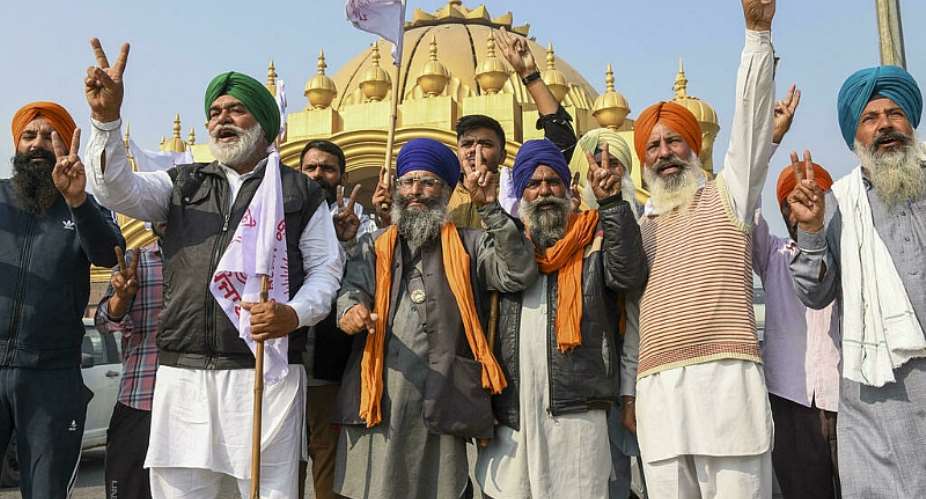In a stunning about-face just months before elections in crucial states like Uttar Pradesh and Punjab, Indian Prime Minister Narendra Modi said his government would scrap three controversial agricultural laws that prompted farmer protests across the country for nearly a year.
The move comes on the festival of Guru Purab, when Sikhism founder Guru Nanak's birthday is celebrated, mainly in Punjab.
"While apologising to the nation, I want to say with a sincere and pure heart that maybe something was lacking in our dedication that we could not explain the truth, as clear as the light of the lamp, to some of our farmer brothers,” Modi said in an address to the nation.
“Today, I want to tell the country that we have decided to repeal the three farm laws.”
India enacted three controversial agriculture laws aimed at liberalising the country's farm sector.
The government had argued that the new laws will give freedom to farmers to sell their produce outside regulated markets and enter into contracts with buyers at a pre-agreed price.
Farmers argue that the new laws would have lowered crop prices and hurt their earnings. Protesters clashed with the police on multiple occasions over the past several months.
Celebrations
There was jubilation at several border points adjoining the national capital where farmers have been protesting for nearly a year. Toddlers with yellow farmer flags walked around, while music blared from speakers fixed on tractors. Young men distributed sweets.
“It is a day of happiness, as the farm laws have been repealed on the auspicious day of Guru Nanak Dev. But Prime Minister Modi has not done a favour to the farmers — rather, this was the right of the farmers,” farmer leader Darshan Pal told RFI.
“Better late than never…We want to thank Prime Minister Modi but he didn't say anything concrete on the minimum support price yet,” said another farmer, Balbir Singh Rajewal.
The ruling Bharatiya Janata Party (BJP) has faced massive anger in northern states, something it cannot afford as it preps for big elections ahead, including the 2024 national polls.
“The rollback is politically expedient for the BJP as it seeks re-election in Uttar Pradesh, a big decider ahead of 2024.
It feared that it would lose voters in western Uttar Pradesh, one of the epicentres of the farmer protests,” political scientist Sudha Pai told RFI.
A hard-fought victory
Farmer unions said that more than 700 demonstrators and activists have died during the protests. Dozens of farmers died due to suicide, hostile weather conditions and Covid-19 during the demonstrations.
Last month, nine people reportedly died in Uttar Pradesh after a car owned by a politician allegedly ran over protesting farmers.
Farmer unions also reminded Modi that the agitation of farmers is not just for the repeal of three farm laws, but also for a statutory guarantee of remunerative prices for all agricultural produce and for all farmers.
“This important demand of farmers is still pending. So also, is the withdrawal of the Electricity Amendment Bill.
The Sanyukt Kisan Morcha (SKM), the umbrella body of farmers' unions, said in a statement that it would take note of all developments, hold its meeting soon and announce further decisions.
Stalemate
It took months of road blockades and demonstrations, and a decision by India's Supreme Court to delay the implementation of the maws before Modi backed down.
The stalemate between the farmers and the government has been one of the most significant policy challenges faced by Modi.
Agriculture is the primary source of livelihood for about half of India's 1.3 billion population but accounts for only around 15 percent of GDP.
Farm reform policies tend to be politically sensitive in nature.





 Meta releases new version of conversational AI across its platforms
Meta releases new version of conversational AI across its platforms
 Cape Town named Africa’s Best Airport 2024 by Skytrax
Cape Town named Africa’s Best Airport 2024 by Skytrax
 Bono East: Four injured after hearse transporting corpse crashes into a truck
Bono East: Four injured after hearse transporting corpse crashes into a truck
 ‘Be courageous, find your voice to defend our democracy’ — Sam Jonah urges journ...
‘Be courageous, find your voice to defend our democracy’ — Sam Jonah urges journ...
 Exodus of doctors, nurses and teachers have worsened because of unserious Akufo-...
Exodus of doctors, nurses and teachers have worsened because of unserious Akufo-...
 2024 election: Avoid insults, cutting down people in search of power – National ...
2024 election: Avoid insults, cutting down people in search of power – National ...
 ‘You passed through the back door but congratulations’ — Atubiga on Prof Jane Na...
‘You passed through the back door but congratulations’ — Atubiga on Prof Jane Na...
 Government’s $21.1 billion added to the stock of public debt has been spent judi...
Government’s $21.1 billion added to the stock of public debt has been spent judi...
 Akufo-Addo will soon relocate Mahama’s Ridge Hospital to Kumasi for recommission...
Akufo-Addo will soon relocate Mahama’s Ridge Hospital to Kumasi for recommission...
 We must not compromise on our defence of national interest; this is the time to ...
We must not compromise on our defence of national interest; this is the time to ...
